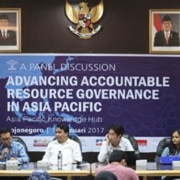
Civil society activists demonstrating against the bill to eliminate direct elections for regional leaders. Photo by Transparency International Indonesia.
Indonesia’s civil society stands to lose from the Australian government’s massive cut in aid to the country. Much of the discussion of the cuts has overlooked this.
It is critical that civil society continues to have access to Australian development assistance because it has been a key element in the consolidation of democracy in Indonesia. Since the events leading to the fall of former President Soeharto in 1998, civil society organisations have led calls for greater accountability and responsiveness from elected representatives and government officials. They have exposed corruption, defended direct elections, improved delivery of social services to vulnerable Indonesians, and played a vital role in reform of the justice sector.
For Australia, funding civil society is an important and cost-effective way to advance Australia’s interests in a strong, stable, and democratic Indonesia. A more transparent, accountable and popularly legitimate Indonesian government will be a more predictable and reliable economic and security partner to Australia. Weaker civil society will not only result in less effective delivery of social services to Indonesians but could also lead to a decline in the quality of Indonesian democracy, worsening legal consistency, and fewer checks on corruption. All of these will have significant consequences for the bilateral relationship.
Indonesia’s anti-corruption movement, in particular, would have foundered without the active participation of civil society. Indonesia Corruption Watch (ICW), which has long been supported by Australian development assistance, has been resolute in its efforts to name and shame corrupt government officials. For years, it has played a central role in coordinating civil society efforts and rallying public support for the Corruption Eradication Commission (KPK) as it has faced repeated attacks from the police.
Indonesian civil society organisations also spearheaded efforts to promote transparency and access to information during the 2014 legislative and presidential elections. Australian funds supported local organisations like the Association for Elections and Democracy (Perludem) to push for elections data transparency, which helped to create an environment where crowdsourcing groups like www.kawalpemilu.org could safeguard the disputed presidential count.
Civil society organisations have also played a vital role in defending crucial democratic reforms. When, in the dying days of their period in office last September, lawmakers passed a law scrapping direct elections for regional leaders, the only concerted opposition came from civil society. Although advocacy was not funded directly by Australian assistance, organisations such as Perludem, the People’s Voter Education Network (JPPR), ICW, and Solidaritas Perempuan had benefited from development assistance to the extent that they had the institutional strength, confidence and networks to quickly launch a campaign to oppose the change. And they won.
Beyond its influence as a scrutineer and guardian of democratic reform, civil society has been an effective partner in delivering technical assistance to government. The Centre for Detention Studies, for example, which also receives Australian funds, has been a key partner in the delivery of research, policy advice and training to the Directorate General of Corrections as it introduced an electronic prisons database. The database has contributed to tackling terrorism through improved identification of prisoners and their networks with visitors, addressed corruption in prison management, and reduced prison overcrowding.
Elsewhere in the justice sector, Australian development assistance has supported pilot programs that have massively reduced the number of children that courts send to prison (from 76 per cent to 51 per cent last year alone). It has also supported the establishment of a state-funded legal aid system, and the introduction of circuit courts so that people in isolated areas can have their cases resolved. Civil society has been involved in some way in all these reforms, and would not have been able to play the role it did without development assistance.
It is important to note that reformers within the government turn to civil society organisations for policy ideas, evidence and advocacy partially because of the complex political and bureaucratic hurdles that have been set up over decades to prevent reformers from within having access to support from outside. These include, for example, restrictive procurement regulations that make it difficult for government agencies to directly purchase research from independent, high-quality sources.
At this stage, it is unclear how great an impact the recent cuts in Australian aid will have on civil society. Although some organisations have been successful in generating local sources of funding, Indonesia does not have a long history of public donation to organisations working on democratic governance. Government and private sector support, meanwhile, is difficult to secure for governance programs. It is important that civil society continues to have access to foreign development assistance.
A 40 percent cut in Australian funds is not going to have a dramatic effect on Indonesia’s state budget. But it does have the potential to compromise one of the key partners in Indonesia’s democratic story. The small amount saved by the Australian government now could have significant consequences down the track, for both Indonesia and Australia.










